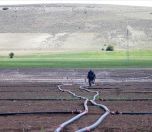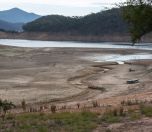* Photo: Pixabay
Click to read the article in Turkish
The Ministry of Agriculture and Forestry of Turkey has released a report entitled "Climate Change and Agriculture."
The report has shown that a wider part of Turkey will be affected by drought, warning that agricultural policies need to be developed by considering that temperatures will rise by 2-3 degrees in the upcoming period.
As reported by Meltem Özgenç from daily Hürriyet, the report estimates an increase of up to 85 percent in food prices across the world in 30 years.
Located in the Mediterranean Basin, one of the regions expected to be affected by global climate crisis the most, Turkey will witness droughts in wider regions in its geography. Estimating that days with extreme temperatures will increase in number in near future, the report has warned that this problem needs to be seriously addressed by policy makers.
In its report, the Ministry has also listed what effects climate change will have, what will change with rising temperatures across the globe and what can be done to curb the effects of this crisis.
Effects of climate change
- Climate conditions will be marked by higher temperatures and less precipitation.
- There will be an increase in the intensity of droughts, the quality of water and soil will get worse.
- Ecosystem will be impaired and biological diversity will drop.
- Ecological sites will shift, agricultural production and quality will drop.
- While pests and diseases will multiply, there will be problems with fertilization and disinfection.
- There will be problems with sustainable food safety.
What will change with global warming?
According to the report, if global temperatures rise by one degree Celcius, land productivity will drop by 6 percent in wheat, 7.4 percent in corn, 3.2 percent in rice and 3.1 percent in soybeans.
If global temperatures increase by 3 degrees (by 2050, as estimated), the loss of productivity is expected to drop by 25-50 percent.
A decrease in soil productivity can also lead to a decrease in nutrients in soil, forcing farmers to use more chemical fertilizers.
What can be done to reduce these effects?
- In developing agricultural policies for Turkey in 10- and 20-year periods, a temperature rise of 2-3 degrees and the effects likely to be caused by such a rise need to be considered in the realm of possibility and the policies need to be planned with this scenario in mind.
- In order to ensure that agriculture is positively affected, rainwater harvesting should be used.
- Water should be used sparingly, a direct-drilling system and windbreak should be used.
- Fertilization, land consolidation, organic farming and bioenergy sources should also be among the methods to follow.
- In order to be prepared for the effects of climate change, a mobilization should be initiated to ensure adaptation to climate change in agriculture.
- An fund must be urgently created for adaptation to climate change.
- Low income farmers should be provided with economic support so that they can adapt to the effects of climate change.
- Direct-drilling methods should be more widespread.
- A 100-percent pressurized irrigation should be adopted.
- Climate-based dynamic agricultural insurance should be more widespread.
(TP/SD)














